thing to stem the current of a popular opinion.
But one can only go with the stream when one thinks
the stream is flowing in a right channel. And
here I think the stream is meandering out of its course.
For me, Little Nell is scarcely more than a figure
in cloudland. Possibly part of the reason why
I do not feel as much sympathy with her as I ought,
is because I do not seem to know her very well.
With Paul Dombey I am intimately acquainted. I
should recognize the child anywhere, should be on the
best of terms with him in five minutes. Few things
would give me greater pleasure than an hour’s
saunter by the side of his little invalid’s carriage
along the Parade at Brighton. How we should laugh,
to be sure, if we happened to come across Mr. Toots,
and smile, too, if we met Feeder, B.A., and give a
furtive glance of recognition at Glubb, the discarded
charioteer. Then the classic Cornelia Blimber
would pass, on her constitutional, and we should quail
a little—at least I am certain
I
should—as she bent upon us her scholastic
spectacles; and a glimpse of Dr. Blimber would chill
us even more; till—ah! what’s this?
Why does a flush of happiness mantle over my little
friend’s pale face? Why does he utter a
faint cry of pleasure? Yes, there she is—he
has caught sight of Floy running forward to meet him.—So
am I led, almost instinctively, whenever the figure
of Paul flashes into my mind, to think of him as a
child I have actually known. But Nell—she
has no such reality of existence. She has been
etherealized, vapourized, rhapsodized about, till
the flesh and blood have gone out of her. I recognize
her attributes, unselfishness, sweetness of disposition,
gentleness. But these don’t constitute a
human being. They don’t make up a recognizable
individuality. If I met her in the street, I
am afraid I should not know her; and if I did, I am
sure we should both find it difficult to keep up a
conversation.
Do the passages describing her death and burial really
possess the rhythm of poetry? That would seem
to me, I confess, to be as ill a compliment as to
say of a piece of poetry that it was really prose.
The music of prose and of poetry are essentially different.
They do not affect the ear in the same way. The
one is akin to song, the other to speech. Give
to prose the recurring cadences, the measure, and the
rhythmic march of verse, and it becomes bad prose without
becoming good poetry.[15] So, in fairness to Dickens,
one is bound, as far as one can, to forget Horne’s
misapplied praise. But even thus, and looking
upon it as prose alone, can we say that the account
of Nell’s funeral is, in the high artistic sense,
a piece of good work. Here is an extract:
“And now the bell—the bell she had
so often heard, by night and day, and listened to
with solemn pleasure almost as a living voice—rang
its remorseless toll, for her, so young, so beautiful,
so good. Decrepit age, and vigorous life, and
blooming youth, and helpless infancy, poured forth—on




